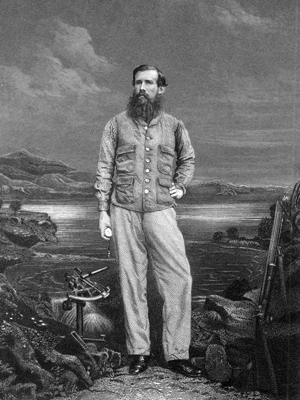Journal of the Discovery of the Source of the Nile. Edinburgh: William Blackwood and Sons, 1863. [Rare Books Division]

In the following pages, I have endeavoured to describe all that appeared to me most important and interesting among the events and the scenes that came under my notice during my sojourn in the interior of Africa. If my account should not entirely harmonise with preconceived notions as to primitive races, I cannot help it. I profess accurately to describe naked Africa—Africa in those places where it has not received the slightest impulse, whether for good of for evil, from European civilisation. If the picture be a dark one, we should, when contemplating these sons of Noah, try and carry our mind back to that time when our poor elder brother Ham was cursed by his father, and condemned to be the slave of both Shem and Japheth; for as they were then, so they appear to be now—a strikingly existing proof of the Holy Scriptures.
—Speke (p. xiii)
From childhood, Speke was educated for the military. In the British Indian Army he served in the Sikh war, participated in a number of significant battles, and was promoted to captain in 1852. Subsequently, he made three exploratory trips to Africa, the first two (1854-1855, 1857-1859) accompanying Sir Richard Francis Burton [see BURTON]. He returned in 1860 with his friend and fellow Indian army officer James Augustus Grant (1827-1892) on an expedition organized by the Royal Geographic Society and supported by the British government. Their purpose was to explore the Victoria Nyanza area and confirm Speke’s earlier view that the lake was the source of the White Nile.
On 25 September 1860, their caravan left Zanzibar: a force of 217 people, including armed men and porters bearing loads of beads, cloths, and brass wire intended as gifts for safe passage. They arrived at Kazé (today’s Tabora, Tanzania) on 24 January 1861, but further headway was hindered by the defection of carriers, local warfare, the rapacity of chiefs who controlled travel through the territory, and a serious illness suffered by Speke. Moving north between lakes Tanganyika and Victoria, and often traveling separately, Speke and Grant encountered further delays in the kingdoms of Mtésa (Mutesa), the ruler of Uganda, and Kamrasi (Kamurasi), the king of Unyoro. On 28 July 1862, Speke reached the point where the White Nile left Lake Victoria, naming it Ripon Falls—and establishing in his mind the veracity of his claim that the river began there. At Karuma Falls, where the river makes a big turn west, native warfare forced him to cut across country. Ultimately, the expedition reached Gondokoro on 15 February 1863, where Sir Samuel White Baker, coincidentally on his own self-funded mission up the Nile [see BAKER], was able to offer needed assistance.
Back in England, Speke was showered with honors and feted by the Royal Geographical Society. But doubts of his claim remained, voiced particularly by Burton, primarily because Speke had not followed the Nile from Karuma Falls to Gondokoro. (Using Speke’s maps, Baker would discover what Speke had thereby missed: Lake Albert.). A debate with his former friend-turned-nemesis Burton was arranged for 16 September 1864 to settle the matter; however, on that morning word arrived that Speke had died in a gun accident. Some thought it was a suicide, for he was known as an accomplished sportsman and hunter. Speke and Grant’s successes are undisputed, however: they were the first Europeans to cross equatorial eastern Africa, and their explorations added more than 500 miles to the known geography of the area. And today Lake Victoria and its feeder streams are considered the sources of the White Nile.